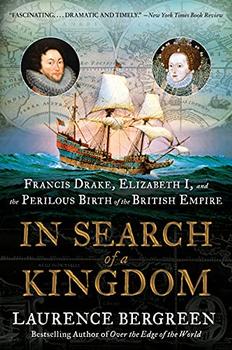Summary | Excerpt | Reviews | Beyond the Book | Readalikes | Genres & Themes | Author Bio

Francis Drake, Elizabeth I, and the Perilous Birth of the British Empire
by Laurence Bergreen
Henry had condemned Martin Luther, the German monk who launched the Protestant revolution, as "a venomous serpent, a pernicious plague, infernal wolf, an infectious soul, a detestable trumpeter of pride, calumnies and schism"—a description endorsed by Pope Leo X. Several years later, Luther further challenged Roman orthodoxy by marrying a nun, Katherine of Bora, with whom he had five children, and retreating from the revolution he had launched.
But for now, in 1521, Leo X, nearing the end of his life, looked to Henry VIII to champion the church. The king in response wrote "Defence of the Seven Sacraments," which attacked Luther's theology and earned Henry the title "King of England and France, Defender of the Faith and Lord of Ireland." But matters did not rest there. Tension between England and the Vatican grew until, in 1538, Pope Paul III excommunicated Henry and deprived him of the title "Defender of the Faith."
Seeking a male heir to the throne, the king had tried in 1527 to persuade the pope to annul his twenty-three-year marriage to Catherine of Aragon, with whom he had a daughter. When the pope refused, Henry formed the Church of England, which would permit him to marry his longtime mistress, Anne Boleyn. Henry had previously bedded and spurned Anne Boleyn's sister, Mary. Anne, not wanting to repeat this pattern, insisted that they marry before they embarked on sexual intimacy. But would the pope agree?
Henry dispatched his influential chancellor, Cardinal Wolsey, to request an annulment of his marriage to Catherine. Wolsey was unsuccessful and found himself in jeopardy with the king. He offered a magnificent new palace at Hampton Court to Henry in a bid to save his status but died before Henry subjected the cardinal to the humiliation of a mock trial for disloyalty.
Lusting for Anne and tantalized by the prospect of a male heir at last, Henry married her in secret under the auspices of the newly constituted Church of England. When she became pregnant, his court astrologers agreed with their king's prediction that the child of his second marriage would be a boy. Instead, Anne Boleyn gave birth to a girl: Elizabeth.
He was so disheartened by the newborn's gender that he did not attend the baby's christening, and he blamed her mother for the treachery of giving birth to a girl. Condemned as a witch, Anne Boleyn became known as "the great Whore." Henry was not one to forgive. Two years later, he determined to behead his second wife.
"I have only a little neck," Anne pleaded while placing her hands over her exposed throat. An experienced executioner imported from Calais dispatched her with a stroke of his massive sword as she stared at him with open eyes.
Later, the story spread that Anne Boleyn had a sixth finger—a sign of the devil. In England at the time, the devil was considered real and powerful. (Some paintings of Anne Boleyn indicate a small bump, possibly an extra nail, protruding from the little finger of her left hand.) Her daughter, only a toddler, was declared illegitimate, and it was said that Henry could not bear to set eyes on little Elizabeth. Her nanny had to beg for essentials for the girl, "for she hath neither gown, nor kirtle, nor petti coat, nor no manner of linen, nor foresmocks, nor kerchiefs, nor sleeves, nor rails, nor body-stitchets, nor mufflers, nor biggins" (a sleeping cap). With the birth of Prince Edward to Henry's next wife, Jane Seymour, Elizabeth remained outside the line of succession until 1544, two years after Henry beheaded Catherine Howard, his fifth wife, on suspicion of adultery.
Despite her straitened circumstances, young Elizabeth learned Latin and Greek from Roger Ascham, a scholar and scribe. Later, she was trained in public speaking—a rare skill for a woman of that era.
Henry lived on a while longer, injuring his leg at a jousting tournament at Greenwich Palace on January 24, 1536, when he was thrown from his horse, which proceeded to fall on him. He lay unconscious for two hours. His leg became ulcerated. Unable to exercise, he became morbidly obese, expanding to well over three hundred pounds. His eyesight failing, subject to spells of paranoia, he lived for eleven more years, marrying six times in all. He died on January 28, 1547, at the age of fifty-six, leaving the religious and political landscape dramatically transformed.
Excerpted from In Search of a Kingdom by Laurence Bergreen. Copyright © 2021 by Laurence Bergreen. Excerpted by permission of Custom House. All rights reserved. No part of this excerpt may be reproduced or reprinted without permission in writing from the publisher.
Your guide toexceptional books
BookBrowse seeks out and recommends the best in contemporary fiction and nonfiction—books that not only engage and entertain but also deepen our understanding of ourselves and the world around us.